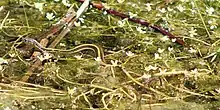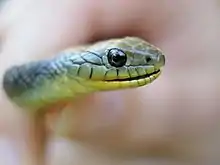| Aquatic garter snake | |
|---|---|
 | |
| Aquatic garter snake at Sibley Volcanic Regional Preserve | |
| Scientific classification | |
| Domain: | Eukaryota |
| Kingdom: | Animalia |
| Phylum: | Chordata |
| Class: | Reptilia |
| Order: | Squamata |
| Suborder: | Serpentes |
| Family: | Colubridae |
| Genus: | Thamnophis |
| Species: | T. atratus |
| Binomial name | |
| Thamnophis atratus (Kennicott, 1860) | |
| Synonyms | |
The aquatic garter snake (Thamnophis atratus) is a species of colubrid snake. Three subspecies are currently recognized.
Geographic range
It is found exclusively along the coast of Oregon and California.
Description
The aquatic garter snake grows up to 18–40 inches (46–102 cm) long. Its dorsal coloration varies greatly. The different coloration patterns are: pale gray with alternating rows of darker blotches on the sides, dark brown with borders that are less distinct, or nearly all black. A long yellow stripe running down the back may be present or absent, only confined to the neck, or just very indistinct. The throat and underside of the snake are whitish to yellow.
One color morph of the aquatic garter snake has a blue-gray background color with a faint olive-colored dorsal stripe and white dots along its sides. Another color morph has a yellow dorsal stripe with black spots along its sides. The second color morph has the more classic garter snake look; however, due to its behavior and scalation, it is grouped in this species.
Habitat
It can most commonly be found on the edges of bushlands, woodlands, grasslands, and forests near ponds, marshes, streams and lakes.
Behavior
When feeling threatened, this snake will seek shelter in a nearby water source. Occasionally, while the snake is hunting for food in a stream, it will flick its tongue above the water to mimic an insect that a small fish would usually eat, thus luring the prey into its mouth.
Reproduction
The aquatic garter snake bears live young. Broods consist of three to 12 young.
Subspecies

References
- ↑ The Reptile Database. www.reptile-database.org.
- Peterson Field Guide - Western Reptiles and Amphibians - 3rd Edition
